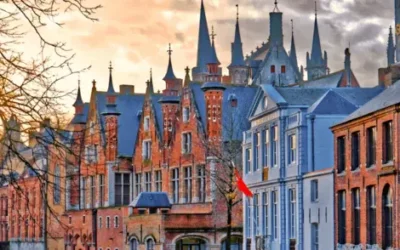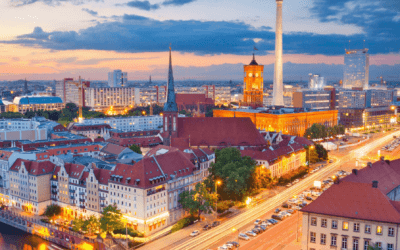Reporting from: Sofitel Hotel, Siem Reap, Cambodia
The Explorer Lounge here at the Sofitel is quite something. One part indoor garden patio and one part luxury bar, it’s a meeting spot for some of the top players in town.
Siem Reap is a world away from Cambodia’s capital city of Phnom Penh. The largely seasonal tourist trade – led by the magnificent Angkor temple complex – rules the market here, with agricultural activity rampant only fifteen minutes in any direction from the city’s outskirts.
Nevertheless, small fortunes have been made in Siem Reap despite its less industrial status.
And interestingly enough, one of those fortunes started right here in this hotel.
I had a great breakfast with an expat contact of mine in the real estate businesshere, and he told me about all of the people like him who have made a lot of money in Siem Reap.
One of them is the founder of Blue Pumpkin, an ice cream store and cafe that’s ubiquitous in Cambodia. Curtat is a French expat who worked his way up to being one of the top pastry chefs in Bangkok’s competitive hotel scene. Then, sensing opportunity further east, he and his Thai wife packed their bags and moved to Siem Reap, where he took a chef job at the Sofitel in Siem Reap.
With no job, his wife started a small business in a tiny storefront that cost about $250 a month. First, she sold carved fruits to locals. Then she borrowed a page from her husband’s playbook and sold small cakes. The fruits and cakes were a hit, and she expanded into other baked goods.
Within a year, founder Arnaud Curtat quit his job here at the Sofitel and joined his wife to expand their product line. Fresh baked breads were made and quickly sold out. Blue Pumpkin couldn’t keep them in stock. Arnaud used his connections in the Siem Reap hotel scene to sell large orders to seemingly every hotel in town.
As time went on, the Blue Pumpkin empire grew. Fruits and cakes turned into bread turned into ice cream. The original small storefront on a dusty road was replaced with a much larger facility and, eventually, nine company-owned locations throughout town. And more and more places around Siem Reap wanted to sell Blue Pumpkin products, which are now available in practically every supermarket and tourist area around town.
In well under ten years, Blue Pumpkin went from a tiny fruit and cake stand like countless others in Cambodia to a food empire. Blue Pumpkin locations are now ubiquitous throughout Phnom Penh, as well, with a non-stop flow of tourists buying ice cream cones and cheesecakes in the company’s western-styled stores.
Local Cambodians have taken notice, too, and appreciate the more international theme to Blue Pumpkin’s stores. Arnaud never wanted his stores to be in the traditional Khmer style; he realized that tourists and locals alike want a taste of another part of the world every once in awhile.
After ten years in the business, Arnaud sold a little more than half of his stake in Blue Pumpkin to some serious investors. While the numbers haven’t been disclosed, people I’ve spoken with suggest it’s at least $1 million.
While that might not be private equity-level money, it’s quite an accomplishment for a couple who came to Cambodia with just a dream and a desire to make a second income for their family.
Just like immigrants to countries like The Land of the Free long ago, Cambodia and countries like it offer immigrants “fresh off the boat” the opportunity to do what they’re passionate about, without a lot of government interference or the need to know a lot of regulations.
That leaves people like Arnaud the ability to focus on creating great products rather than hassling with bureaucrats.
Earlier this month, I shared how private equity funds are achieving significant, but less scalable returns, in Cambodia. There is some smart money in this country, but there is also room for the smaller-scale entrepreneur. While cakes and fruits are probably oversupplied in most tourist areas now, there’s plenty of room to innovate in small ways.
Just yesterday, I saw a storefront offering “disco-tuks”, a tuk-tuk service that shuttles tourists to Siem Reap’s Angkor Wat temples alongside pounding disco music. Considering Siem Reap was the only tourist destination of note in Cambodia for a long time, the market is more established and seems to have a higher-end clientele than you’d find in other parts of the country.
Clientele that would be more likely to pay a reasonable premium to have an extra experience, whether that’s a tuk-tuk blaring disco, or something else you could dream up.
Doing business in Cambodia is a long-term play and you should be here to manage your operations. Liquidity in the country isn’t much to talk about.
As Cambodia develops more and more, however, I think chains like Blue Pumpkin will look more and more attractive to international players. Foreign coffee chains Leaf have stores in Cambodia, but are facing competition from a very savvy group of locals who run a chain called Brown Coffee. And word on the street is Brown is doing everything right to maintain its dominance.
In cases like those, I think some regional or international companies might opt to buy into or completely take over a well-run local company rather than enter an increasingly over-crowded market. It already happens in the western world. Once Cambodia has a more developed economy, it’s only natural for more international dollars to flow in and fill in this gap between Thailand and Vietnam.
Arnaud Curtat has shown it is possible.










